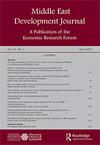The determinants of voting for Islamists in Egypt’s first post-revolution elections 2011–2012
IF 0.8
Q4 DEVELOPMENT STUDIES
引用次数: 1
Abstract
This paper studies empirically the voting outcomes for the first post-revolution presidential elections in Egypt. In the light of strong success of the Islamist candidate, Mohamed Morsi, I identify three dimensions which can affect voting outcomes: human capital stock, wealth and employment structure. I find that less educated, poorer and more unequal districts support more Islamists. I also find an effect of the employment structure of a district on voting. I test the results by comparing the determinants of voting outcomes of the presidential elections to those of the 2011 and 2012 constitutional referendums.2011-2012年埃及第一次革命后选举中伊斯兰主义者投票的决定因素
本文对埃及革命后第一次总统选举的投票结果进行了实证研究。鉴于伊斯兰候选人穆罕默德•穆尔西(Mohamed Morsi)的巨大成功,我确定了可能影响投票结果的三个方面:人力资本存量、财富和就业结构。我发现受教育程度较低、较贫穷和更不平等的地区支持更多的伊斯兰主义者。我也发现了一个地区的就业结构对投票的影响。我通过将总统选举投票结果的决定因素与2011年和2012年宪法公投的决定因素进行比较,来检验这些结果。
本文章由计算机程序翻译,如有差异,请以英文原文为准。
求助全文
约1分钟内获得全文
求助全文

 求助内容:
求助内容: 应助结果提醒方式:
应助结果提醒方式:


